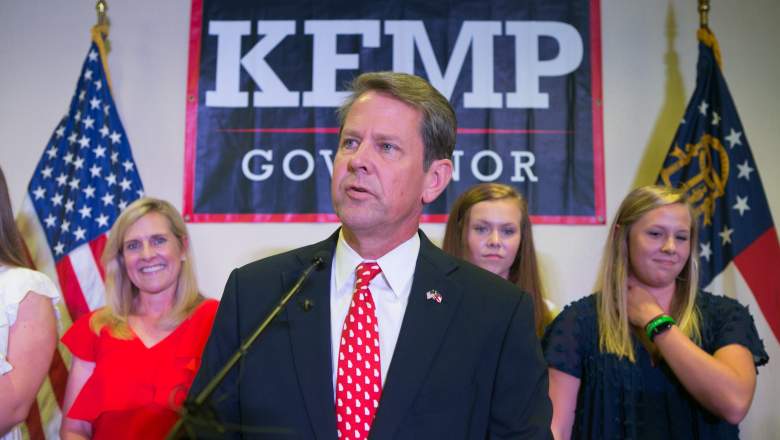
Georgia Secretary of State Brian Kemp is running to be the state’s next governor on a deeply conservative platform that stands in stark contrast with that of his Democratic opponent, former state House Democratic leader Stacey Abrams. Despite running in a state that has not elected a Democrat in a statewide election since conservative Democratic Sen. Zell Miller in 2000, polls show that Kemp is running neck-and-neck with Abrams ahead of Tuesday’s vote.
Kemp, a 55-year-old real estate developer and investor, served in the Georgia state Senate for six years before being appointed as secretary of state in 2010. He was reelected in 2014 by a 15-point margin. Kemp finished second behind Lt. Gov. Casey Cagle in the Republican gubernatorial primary, which went to a runoff because no candidate received the necessary 50 percent of the vote to clinch the nomination. Though the Atlanta Journal-Constitution reports Cagle ran on a campaign embracing President Donald Trump and was expected to be the nominee, Kemp ultimately received Trump’s endorsement in the race, which helped him to an upset win.
Kemp is overseeing his own gubernatorial race as Georgia’s secretary of state and has drawn accusations of voter suppression from voting rights groups. The ACLU and other groups sued after Kemp blocked 53,000 voter registrations — 70 percent of which came from African-Americans — because the information did not exactly match their government records. An independent study also found that 534,000 voters were purged because they supposedly moved out of state, but more than 330,000 of those purged were found to be living at the same address as their registration. Only 41,000 of the purged voters had actually moved out of state. Kemp rejected allegations of voter suppression and said the moves complied with the law while blaming voter registration groups, like the New Georgia Project founded by Abrams, for submitting forms with incorrect information, WABE reported. He also launched an investigation days ahead of the election after accusing Democrats of trying to hack the state electoral system, though he did not provide evidence of the hack, according to The New York Times. The Times reported that Georgia Democrats notified a cybersecurity firm of security concerns regarding the state system before Kemp responded by alleging that they tried to hack it.
Polls show that Kemp and Abrams are in a dead-even race for the future of the state.
Here’s what you need to know:
1. Brian Kemp Wants to “Take a Chainsaw” to Regulations
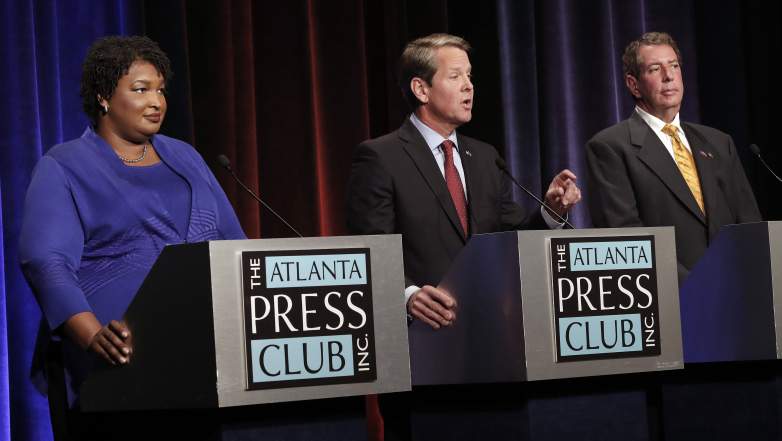
GettyBrian Kemp at gubernatorial debate with Democrat Stacey Abrams and Libertarian Ted Metz
Like many Republican candidates, a core part of Kemp’s platform is a promise to slash regulations, which he says hamper small businesses in the state. He told The Gainesville Times that he will cut the state’s bureaucracy and wants to implement a requirement similar to Trump’s mandate that two regulations be cut for every new regulation that is created. He also called for the creation of a commission that “reviews and removes red tape in state government.”
Kemp also said he has no plans to create regulations to tackle climate change and said local communities can set their own standards and rules, The Atlanta Journal-Constitution reports. He has rejected efforts to remove Confederate statutes in the state, saying in a statement to WABE that “we should learn from the past — not attempt to rewrite it.”
Kemp opposes Medicaid expansion in the state and has called for free-market alternatives to Obamacare.
He is not as anti-regulation when it comes to voting, calling for a voter ID law to protect elections from the threat of illegal voters.
Abrams has called for more workplace protections to protect disadvantaged populations and environmental regulations to protect against the threat of climate change. She backs Obamacare and supports expanding Medicaid to 500,000 people in the state. She has demanded the removal of Confederate statues and has accused Kemp of “voter suppression.”
2. Brian Kemp Has a Plan to Give Rural Communities More Power
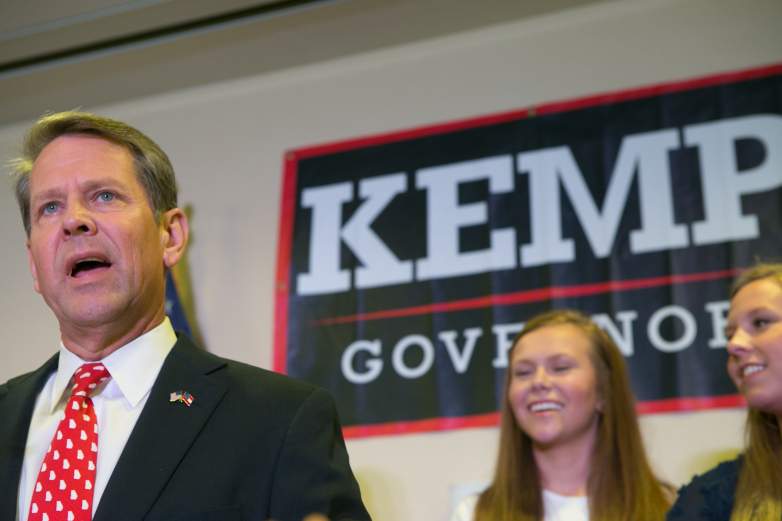
Brian Kemp speaks to supporters after clinching Republican nomination.
Kemp often talks about strengthening rural communities, lamenting the lack of high-speed internet available in certain areas and the lack of resources available in rural hospitals. Kemp has called for expanding access to high-speed internet to the 25 percent of rural Georgians who don’t have access, which experts peg at a cost of $18,000 to $30,000 per mile.
He has said he will expand access to primary care doctors in rural areas through a loan forgiveness program for physicians, increase the Rural Hospital Tax Credit Program from $60 million to $100 million, and use his high-speed internet initiative to improve connectivity in the medical sector.
Kemp has proposed giving more money to rural schools and private schools to improve the quality of education and a $600 million annual plan to raise teacher pay by $5,000. Lawmakers said the plan would likely cost closer to $800 million when factoring in pensions and benefits, The Atlanta Journal-Constitution.
Kemp rejected plans to expand state-funded transit and impose congestion pricing on highways, saying the plan benefits urban areas at the expense of rural areas. He has instead called for prioritizing projects like expanding truck routes so highways can accommodate more shipments, The Atlanta Journal-Constitution reported.
Abrams has called for expanding early childhood education across the entire state, raising teacher pay to the national average, and overhauling the way schools are funded, though it’s unclear how she would pay for these initiatives. She has also called for expanding mass transit, both as a practical way to speed up commutes and as an effort to tackle climate change.
3. Brian Kemp Wants to Protect Gun Rights While Cracking Down on Marijuana

Brian Kemp speaks with reporters on primary night.
Kemp is a staunch defender of the Second Amendment and opposes any new gun restrictions. The Atlanta Journal-Constitution reports he also supports a “constitutional carry” law, which would allow any legal gun owner to conceal carry handguns without a permit. Kemp also backs sales tax holidays for firearms and ammo. He has called for the elimination of some “gun-free zones.” He also backs a $90 million safety grant program that would give $30,000 to each school to spend as they see fit, whether on an armed security officer or metal detectors or other operational costs. Kemp has been endorsed by Georgia Carry and the NRA, which gave Kemp an A+ rating on his legislative record.
Kemp is not as supportive of access to marijuana, though he has said he has no plans to change the current accessibility of medical marijuana in Georgia and tepidly supported expanding the program. He has rejected calls to allow medical marijuana users to grow their own plants. The current law allows people suffering from one of more than a dozen applicable illnesses to register for permission to possess up to 20 ounces of cannabis oil, but because of the ban on growing, patients risk violating federal laws about transporting marijuana across state lines. Kemp strongly opposes legalizing recreational marijuana.
Abrams has called for universal background checks on all gun purchases and repealing a “campus carry” law that allows permit holders to bring guns on cllege campuses. She supports decriminalizing certain marijuana offenses and allowing medical marijuana patients to grow their own plants.
4. Brian Kemp Is Fighting Against Increased Government Spending & Taxes
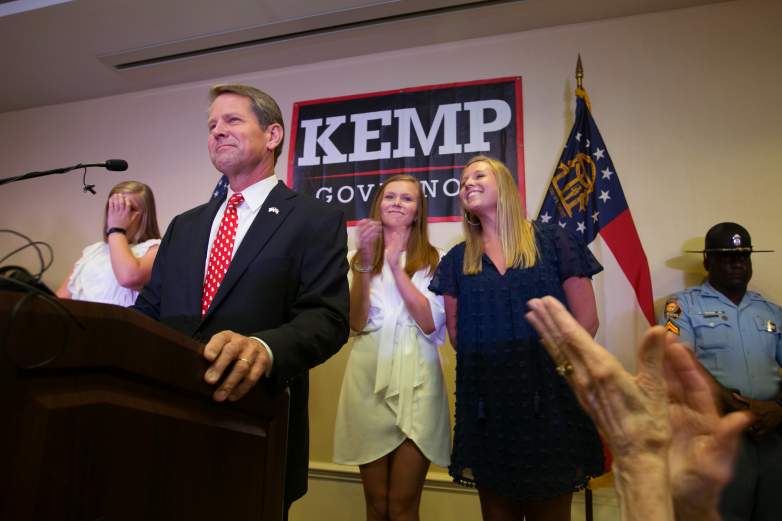
GettyBrian Kemp defeats Casey Cagle in runoff election for Republican nomination.
Kemp has proposed imposing a cap on state government spending that would be set based on growth and inflation, and focusing the government’s priorities beyond its largest cities, The Atlanta Journal-Constitution reported. He also supports a state income tax cut and the elimination of what he calls “wasteful” tax incentives. He has called for defunding “sanctuary cities” and college campuses that do not report undocumented immigrants to federal authorities. He also opposes Medicaid expansion.
Although he said he plans to cut taxes, Kemp told the Atlanta Journal-Constitution that “we can do everything we proposed” with “the revenue growth we are seeing in the state.”
“We haven’t just thrown this out there. We’ve analyzed the numbers and feel confident being able to do the teacher pay raise, the other things we’ve talked about,” he told the newspaper. “We are going to continue to keep lowering the tax rates so we have a good business environment which will drive up revenues and keep our state growing.”
Abrams has called for a different approach. “I would rather we think about this in terms of what are the policies we can put in place that increase the prosperity for everyone because that reduces the cost of government,” she told the Journal-Constitution. “You spend less on criminal justice when you have more people who are economically secure, you spend less on emergency room costs when people have better preventative care access, you spend less in trying to address the issue of homelessness when people have access to affordable housing.”
5. Brian Kemp Is a Social Conservative Who Has Embraced Trump’s Immigration Agenda
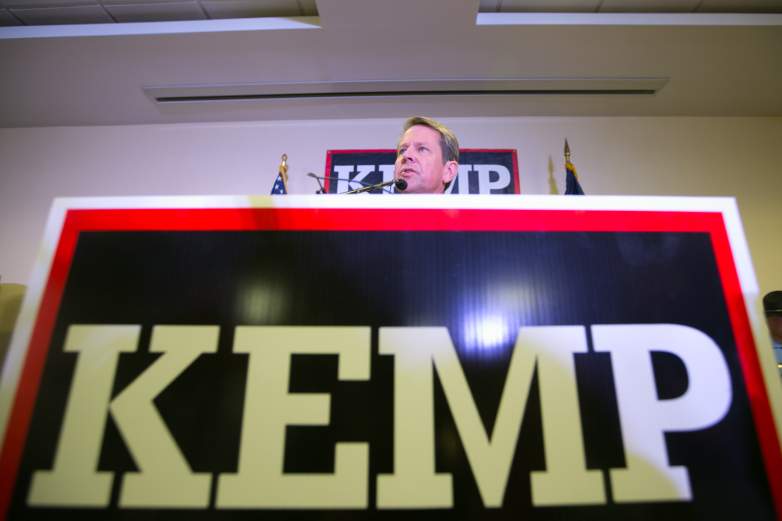
Brian Kemp speaks to primary election watch party in Athens, GA.
Many of Kemp’s non-economic positions align with most of the Republican Party, particularly in its embrace of the president’s agenda. Kemp has repeatedly invoked the threat posed by the gang MS-13, which he has tied to illegal immigration. He has vowed to create a new unit in the state attorney general’s office to fight gang crime, which he called a “crisis” in the state. Kemp also wants to create a database to track undocumented immigrants who have criminal convictions in an effort to speed up deportations.
“I think people are very frustrated with it seeming like the government is always doing something for the special interests or those that are here illegally and not really helping our own citizens,” Kemp said in an interview with The Gainesville Times. “People are just frustrated that any noncitizen can walk into health care facilities and not pay a single dime and get services, and then we have Georgians — working Georgians — that are out there that are not able to get good health care or it’s costing a fortune.”
Kemp also promised to implement the country’s toughest abortion restriction, banning that procedure at 15 weeks into the pregnancy. He similarly vowed to sign a “religious liberty” bill, which would allow businesses to discriminate against LGBTQ Georgians based on religious beliefs, during the primaries, though he later said he would veto any bill that is not similar to the federal Religious Freedom and Restoration Act. Current Gov. Nathan Deal vetoed a previous religious liberty bill passed by the state legislature.
“That does not discriminate,” he said after winning the primary. “If you believe that discriminates, you need to talk to Congress.”
An Emerson College poll and a Marist College poll published last week give Kemp a 1 to 2 percent edge among likely voters.
READ NEXT: Stacey Abrams on the Issues: 5 Fast Facts You Need to Know